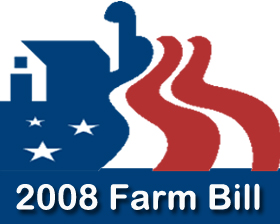United States farm bill
(Redirected from Farm bill)
United States Farm Bill
The United States Farm Bill is a comprehensive piece of legislation that governs an array of agricultural and food programs in the United States. It is updated approximately every five years by Congress and has a significant impact on farming livelihoods, how food is grown and what kinds of foods are available, as well as environmental conservation efforts across the country.
History[edit | edit source]
The first farm bill, known as the Agricultural Adjustment Act, was passed in 1933 as part of President Franklin D. Roosevelt's New Deal. It was created in response to the economic hardships of the Great Depression, aiming to provide financial assistance to farmers and stabilize agricultural prices. Since then, the scope of the farm bill has expanded significantly to include provisions for nutrition assistance programs, conservation, rural development, and research.
Key Components[edit | edit source]
The farm bill is divided into titles, each focusing on a different aspect of agriculture and food policy. The most recent farm bill, as of this writing, includes titles on commodities, conservation, trade, nutrition, credit, rural development, research, forestry, energy, and miscellaneous.
Commodities[edit | edit source]
This title provides support for farmers of certain crops, including corn, soybeans, wheat, cotton, and rice, through income support mechanisms and price and income support programs.
Conservation[edit | edit source]
The conservation title funds programs that help farmers implement practices to conserve water, reduce soil erosion, and maintain wildlife habitats.
Trade[edit | edit source]
This section includes programs that promote U.S. agricultural exports and provide food aid to foreign countries.
Nutrition[edit | edit source]
The largest portion of the farm bill's budget goes to nutrition programs, primarily the Supplemental Nutrition Assistance Program (SNAP), which helps low-income individuals and families afford food.
Rural Development[edit | edit source]
This title aims to improve the quality of life in rural areas through programs that support infrastructure development, business growth, and housing.
Research[edit | edit source]
Funding for agricultural research and extension programs is provided under this title, supporting innovation and technological advancement in agriculture.
Impact[edit | edit source]
The farm bill has a broad impact on the U.S. economy, public health, and the environment. It affects what crops are grown, how they are grown, and who grows them. It also plays a crucial role in ensuring food security for millions of Americans.
Controversies[edit | edit source]
The farm bill often faces criticism from various stakeholders. Some argue that it disproportionately benefits large agribusinesses at the expense of small family farms. Others contend that it encourages the production of unhealthy, processed foods rather than fresh, nutritious options. Environmentalists may criticize the bill for not doing enough to protect natural resources.
Future Directions[edit | edit source]
As the global population grows and climate change poses increasing challenges to agriculture, the farm bill will continue to evolve. Future iterations may place greater emphasis on sustainable farming practices, climate resilience, and ensuring equitable access to healthy foods.
Search WikiMD
Ad.Tired of being Overweight? Try W8MD's physician weight loss program.
Semaglutide (Ozempic / Wegovy and Tirzepatide (Mounjaro / Zepbound) available.
Advertise on WikiMD
|
WikiMD's Wellness Encyclopedia |
| Let Food Be Thy Medicine Medicine Thy Food - Hippocrates |
Translate this page: - East Asian
中文,
日本,
한국어,
South Asian
हिन्दी,
தமிழ்,
తెలుగు,
Urdu,
ಕನ್ನಡ,
Southeast Asian
Indonesian,
Vietnamese,
Thai,
မြန်မာဘာသာ,
বাংলা
European
español,
Deutsch,
français,
Greek,
português do Brasil,
polski,
română,
русский,
Nederlands,
norsk,
svenska,
suomi,
Italian
Middle Eastern & African
عربى,
Turkish,
Persian,
Hebrew,
Afrikaans,
isiZulu,
Kiswahili,
Other
Bulgarian,
Hungarian,
Czech,
Swedish,
മലയാളം,
मराठी,
ਪੰਜਾਬੀ,
ગુજરાતી,
Portuguese,
Ukrainian
Medical Disclaimer: WikiMD is not a substitute for professional medical advice. The information on WikiMD is provided as an information resource only, may be incorrect, outdated or misleading, and is not to be used or relied on for any diagnostic or treatment purposes. Please consult your health care provider before making any healthcare decisions or for guidance about a specific medical condition. WikiMD expressly disclaims responsibility, and shall have no liability, for any damages, loss, injury, or liability whatsoever suffered as a result of your reliance on the information contained in this site. By visiting this site you agree to the foregoing terms and conditions, which may from time to time be changed or supplemented by WikiMD. If you do not agree to the foregoing terms and conditions, you should not enter or use this site. See full disclaimer.
Credits:Most images are courtesy of Wikimedia commons, and templates, categories Wikipedia, licensed under CC BY SA or similar.
Contributors: Prab R. Tumpati, MD

